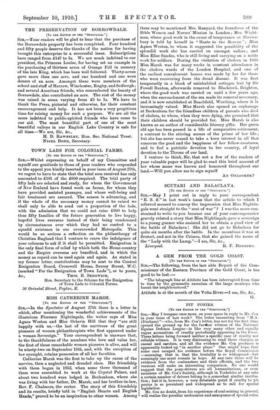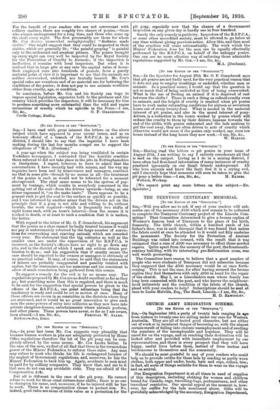PIT PONIES.
(TO THE EDITOR OP THE "SPECTATOR."] Sur,—May I trespass once more on your space in reply to Mr. Cox in your issue of last week? The letter emanating from "M.A. (Durham) "—who, from Mr. Cox's letter, has not for the first time opened the ground up for the further witness of the National Equine Defence League—is like very many other and equally vague accusations of cruelty periodically appearing in the Press. These letters bring forward neither a specific case of cruelty nor reliable witness. It is very distressing to read these charges, so casual and careless, and all the evidence Mr. Cox produces is apparently locked up "in another place." One might hope that some case escaped his evidence before the Royal Commission —assuming, that is, that the brutality is so widespread—but seemingly one must remain in hope. At any rate there will be evidence from the coalmasters and their officials, and the two versions will make an interesting comparison. No one would suggest that the pony-drivers are all humanitarians, or even members of Mr. Cox's Society, although in Yorkshire at any rate a certain number of drivers belong to a somewhat similar institu- tion ; but it is, however, a very debatable point if cruelty to pit ponies is so persistent and widespread as to call for special legislation.
Mr. Cox no doubt, from his experience of coal-mining in general, will realise the peculiar uselessness and annoyance of special rules.
For the benefit of your readers who are not conversant with colliery matters, there are roughly two classes of ponies,—those who remain underground for a long time, and those who come up the shaft every night. The first presumably are those for whom Mr. Cox desires (somewhat metaphysically) " darkness made visible." One might suggest that they could be inspected in their stables, which are generally lit ; "the painful groping" is painful only to the enthusiast and amateur pitman. The ponies brought up every night can very well be inspected by the Royal Society for the Prevention of Cruelty to Animals ; if the inspection is ineffective, it remains with local inspectors. But when it is realised that in large pits at any rate 'the capital value of horse- flesh employed runs into hundreds of pounds, from a purely material point of view it is important to see that the animals are neither overworked, underfed, nor brutally treated. Mr. Cox's special rules are vexatious and of no material use for bettering the conditions of the ponies; it does not pay to use animals worthless either from cruelty, age, or condition.
In conclusion, before Mr. Cox and his Society can hope to impose special legislation, expensive both to the producer and the country which provides the inspectors, it will be necessary for him to produce something more substantial than the wild and vague accusations of cruelty which he upholds in the Press.—I am,







































 Previous page
Previous page